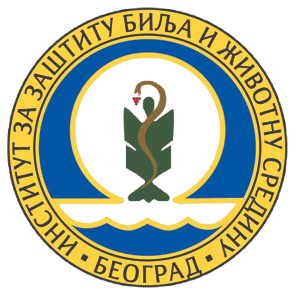
Dr Milana Mitrović
Principal research fellow
Department of Plant Pests
Laboratory for molecular diagnostics
Laboratory for applied entomology
e-mail: milanadesancic@yahoo.co.uk
milanadmitrovic@gmail.com
mob. 062 880 89 24
http://orcid.org/0000-0001-5034-6307
https://www.researchgate.net/profile/Milana_Mitrovic
Research fields
Study of the vector role of cicadas (Hemiptera, Auchenorrhyncha) in the transmission of plant diseases caused by phytoplasmas (Molicutes, 'Candidatus Phytoplasma') in different ecosystems. Study of insect life cycles, host plant preferences and pathogen - insect vector - host plant interaction. Research of biology, harmfulness, ways of introduction and distribution of quarantine, economically important and invasive insects in agricultural production. Application and development of methods of molecular identification of insects; population genetics and molecular systematics; taxonomic characterization and speciation. Study of biology, ecology and population genetics of insects as potential agents for biological control of plant pests and invasive weeds. Detection and monitoring of quarantine and invasive pests in agricultural production, damage assessment, prediction of mass occurrence and development of integrated pest management strategy.
Key publications
1. Jakovljević, M., Jović, J., Krstić, O., Mitrović, M., Marinković, S., Toševski, I., Cvrković, T. (2020): Diversity of phytoplasmas identified in polyphagous leafhopper Euscelis incisus (Cicadellidae, Deltocephalinae) in Serbia: pathogen inventory, epidemiological significance and vectoring potential. European Journal of Plant Pathology, 156, 201-221.
2. Mitrović, M., Jakovljević, M., Jović, J., Krstić, O., Kosovac, A., Trivellone, V., Jermini M., Toševski I., Cvrković, T. (2016): ‘Candidatus phytoplasma solani’ genotypes associated with potato stolbur in Serbia and the role of Hyalesthes obsoletus and Reptalus panzeri (Hemiptera, Cixiidae) as natural vectors. European Journal of Plant Pathology, 144 (3), 619-630.
3. Mitrović M., Tomanović Ž. (2018) New internal primers targeting short fragments of the mitochondrial COI region for archival specimens from the subfamily Aphidiinae (Hymenoptera, Braconidae). Journal of Hymenoptera Research, 64: 191-210.
4. Cvrković, T., Jović, J., Mitrović, M., Krstić, O., & Toševski, I. (2014). Experimental and molecular evidence of Reptalus panzeri as a natural vector of bois noir. Plant Pathology, 63 (1), 42-53.
5. Mitrović M., Jović J., Cvrković T., Krstić O., Trkulja N., Toševski I. (2012) Characterisation of a 16SrII phytoplasma strain associated with bushy stunt of hawkweed oxtongue (Picris hieracioides) in south-eastern Serbia and the role of the leafhopper Neoaliturus fenestratus (Deltocephalinae) as a natural vector. European Journal of Plant Pathology: 134 (3): 647-660.
List of ongoing projects
National projects
1. Project of the program PROMIS of Science Fund of the Republic of Serbia, STOLKit - 6060914: A toolkit for risk assessment integration in modeling a management strategy for stolbur phytoplasma associated diseases in sustainable agriculture.
International projects
Bilateral project between Croatia and Serbia, no 337-00-205/2019-09/38: Epidemiology, genetic peculiarities and insect vectors of phytoplasma Flavescence dorée in vineyards of Croatia and Serbia.
Research fields of interest for scientific collaboration
An integrative approach in the study of insects by a combination of methods of classical taxonomy, molecular biology and field-experimental studies of biology, ecology and biogeography of taxa; vector role of insects in phytoplasma transmission; molecular characterization of epidemiological pathways of phytoplasma transmission and propagation; taxonomic and phylogenetic studies of quarantine, invasive and economically important insects and phytoplasmas of importance for agricultural production; development of "DNA barcoding" methods of molecular identification of quarantine and economically significant pests in agricultural production and beneficial insects; developing methods for forecasting the occurrence of plant pests in order to develop environmentally friendly strategy for their control; study of biology, ecology, taxonomy and population genetics of insects as potential agents for biological control of plant pests and invasive weeds.
Research fields of interest for (co)mentoring master thesis and doctoral dissertation
Taxonomy, phylogeny, population genetics, molecular systematics of insects; developing methods of molecular identification of insects; insect and host plant interaction, co-adaptation, co-evolution, cryptic speciation; vector role of cicadas in phytoplasma transmission and mechanisms of pathogen transmission on time and space scale; interactions between vector insects, pathogens, and host plants.
